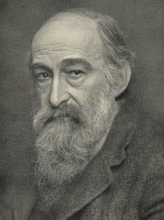Samuel Alexander, British philosopher and Professor of Philosophy at Victoria University, Manchester, was born on 6 January 1859 in Sydney, Australia. He was the fourth child and third son of Samuel and Eliza (née Sloman) Alexander. His father, a saddler, died shortly before his birth, and Alexander was raised by his mother.
In 1863 the family left Sydney for St. Kilda, a suburb of Melbourne, where Alexander entered Wesley College in 1871. His headmaster there, Martin H. Irving, had been educated at Balliol College, Oxford, England. From Wesley College Alexander went to the University of Melbourne, which he left in 1877 without completing his degree after only two years. He won a scholarship to Balliol in that same year and studied with the English literature authority A. C. Bradley (brother of F. H. Bradley, the idealist philosopher). Both T. H. Green and R. L. Nettleship were tutors in philosophy at Balliol during the years Alexander was a student there. However, little is known for certain about his education at Balliol.
After graduating B.A., obtaining first class in mathematical and classical moderations (1879) and in literae humaniores (1881), he was elected a fellow at Lincoln College in 1882, and was the first person of Jewish heritage to obtain a fellowship in either of the ancient English universities. Alexander remained a fellow for eleven years. During that period, he twice had leave of absence, first toward the end of 1888 when he went to deliver lectures on elementary psychology at Toynbee Hall, Whitechapel, London, and then in 1890-1891 when he studied experimental psychology under Hugo Münsterberg at Freiburg-im-Breisgau, Germany.
His first book, Moral Order and Progress (1889), was an expansion of a dissertation he had composed on evolutionary ethics. The dissertation, which was firmly grounded in Darwinian thinking, had been awarded the Green Prize in Moral Philosophy in 1887. C. Lloyd Morgan gave Alexander's book a very favourable review and the two men formed a life-long friendship.
In 1893 Alexander became Professor of Philosophy at Owens College, later transformed into Victoria University of Manchester, where he remained until his retirement in 1924. Reform of the legislation of the Test Act of 1870, which had removed all religious restrictions in higher education and thus had it made possible for him to gain the Lincoln fellowship, did not extend to women, a flaw that Alexander campaigned to rectify during his years at Manchester. Alexander also supported the movement for providing university residences for women.
Alexander’s first book was followed by several articles and an admirable book, Locke (1908). In 1913 Alexander was elected a Fellow of the British Academy (FBA), and one year later he published an elaborate essay, ‘The Basis of Realism’, summarizing the results he had gained during the previous years. Shortly before the First World War, the University of Glasgow invited him to become its Gifford Lecturer. The lectures ‘Space, Time and Deity’ were given in the years 1916 to 1918, and the resulting two-volume publication, Space, Time and Deity (1920), is his magnus opus, a comprehensive system of philosophical thought. This extraordinary work stands quite alone in the history of twentieth-century philosophy, being one of the last attempts by a British philosopher to offer a fully developed speculative worldview.
In 1921 Alexander published Spinoza and Time, and three years later resigned his chair at the University of Manchester. Nevertheless, he continued to deliver orations for honorary graduands until 1930 and he continued to deliver public lectures. In 1925 Art and the Material was published, followed in 1933 by Beauty and Other Forms of Value. Finally a posthumous volume, Philosophical and Literary Pieces appeared in 1939. These last works show that Alexander’s main interest in his late years was in literature and aesthetic theory.
Samuel Alexander never married. He died in Manchester on 13 September 1938 and his ashes lie in Manchester Southern Cemetery. His academic honours include honorary degrees from the Universities of St. Andrews, Durham, Oxford, Birmingham, Liverpool and Cambridge. He was elected an honorary fellow of Lincoln College (1918) and Balliol College (1925), and in 1930 he was awarded the Order of Merit.



